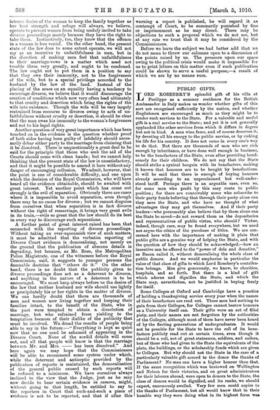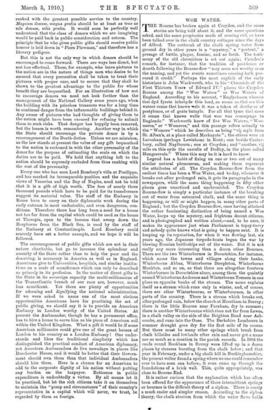PUBLIC GIFTS.
TORD ROSEBERY'S splendid gift of his villa at 4 Posilippo as a summer residence for the British Ambassador in Italy makes us wonder whether gifts of this sort are recognised sufficiently by the nation, and whether Englishmen are encouraged as much as they might be to render such services to the State. For a valuable and useful gift is a real service to the State; and yet it is not generally applauded like other services from which it differs in degree but not in kind. A man wins fame, and of course deserves it, by devoting all his energy to the public service, or by risking his life for his country. It does not come in every one's way to do that. But there are thousands of men who are rich enough by inheritance, or have done well enough in business, to be the benefactors of the State, even after providing hand- somely for their children. We do not say that the State should strike a cynical bargain with its benefactors, making it known that honours are to be bought by benefactions. It will be said that there is enough of buying honours already according to an nnproclaimed but well-under- stood tariff. Perhaps there is an arguable case, even so, for some men who profit by this easy route to public position; for there are conceivably some who subscribe to their party funds believing that through their party alone can they save the State, and who have no thought of what advantages they may get themselves. And if their party leaders—who presumably also believe that by them alone can the State be saved—do not reward them as the depositaries and representatives of public virtue, who should ? Virtue, indeed, though rare, may be found everywhere, but we need not argue the ethics of the purchase of titles. We are con- cerned here with the importance of making it plain that public gifts are a genuine way of helping the State, and with the question of how they should be acknowledged,—how an incentive can be offered to the "power of dole and donative," as Bacon called it, without demoralising the whole class of public donors. And we would emphasise in particular the value of that class of gifts to which Lord Rosebery's contribu- tion belongs. Men give generously, we know, to charities, hospitals, and so forth. But there is a kind of gift which adorns and dignifies the State, and which the State may, nevertheless, not be justified in buying freely for itself.
Some Colleges at Oxford and Cambridge have a practice of holding a thanksgiving service every year when the names of their benefactors are read out. These men had nothing to gain from their Colleges, for Colleges cannot bestow honours as a University itself can. Their gifts were an act of filial piety, and their names are not forgotten by the authorities of the Colleges, although most of them have never been heard of by the fleeting generations of undergraduates. It would not be possible for the State to have the roll of its bene- factors publicly read out at certain times, even though it should be a roll, not of great statesmen, soldiers, and sailors, but of those who had given to the State the equivalents of the plate, the buildings, or the scholarship funds which are given to Colleges. But why should not the State in the case of a particularly valuable gift accord to the donor the thanks of Parliament? No man can have a higher honour than that. If the same recognition which was bestowed on Wellington and Nelson for their victories, and on great administrators for their labours abroad, were open to donors to the State, the, class of donors would be dignified, and its ranks, we should expect, enormously swelled. Very few men could aspire to the thanks of Parliament, but all would know that in their humble way they were doing what in its highest form was ranked with the greatest possible service to the country. Magnum clenunt, magna gratia should be at least as true as vile donuim, gratia. It would soon be perfectly well understood that the class of donors which we are imagining would be paid back in public consideration and esteem. The principle that he who gives public gifts should receive public honour is kid down in " Piers Plowman," and therefore has a literary pedigree.
But this is not the only way in which donors should be encouraged to come forward. There are ways less direct, but not less effectual. Those, for example, who leave pictures to the nation are in the nature of things men who desire to be assured that every precaution shall be taken to treat their pictures with proper care, and to secure that they shall be shown to the greatest advantage to the public for whose benefit they are bequeathed. For an illustration of how not to encourage donors we need not look further than the management of the National Gallery some years ago, when the building with its priceless treasures was for a long time in continual danger from the inflammable buildings behind it. Any owner of pictures who had thoughts of giving them to the nation might have been excused for refusing to submit them to such risks. That danger has happily been removed, but the lesson is worth remembering. Another way in which the State should encourage the private donor is by a rearrangement of the Death-duties. Unless we are mistaken, as the law stands at present the value of any gift bequeathed to the nation is reckoned in with the other personalty of the donor for the purpose of estimating the scale on which the duties are to be paid. We hold that anything left to the nation should be expressly excluded from thus ranking with the rest of the personalty.
Every one who has seen Lord Rosebery's villa at Posilippo, and has marked its incomparable position and the exquisite views of Vesuvius and the Bay of Naples, need not be told .that it is a gift of high worth. The fees of nearly three thousand pounds which have to be paid for its transference suggest its material value. The staff of the Embassy in Rome have to carry on their diplomatic work during the early autumn in most undesirable, and even dangerous, con- ditions. Therefore there has long been a need for a house not too far from the capital which could be used as the house at Therapia, open to the breezes that sweep down the Bosphorus from the Black Sea, is used by the staff of the Embassy at Constantinople. Lord Rosebery could. scarcely have set a better example, and we hope it will be followed.
The encouragement of public gifts which are not in their nature charitable, but go to increase the splendour and amenity of the State rather than to help the poor and the deserving, is necessary in America as well as in England. Americans give to Universities, hospitals, and similar institu- tions on a scale of munificence which can only be described as princely in its profusion. In the matter of direct gifts to the State in its sovereign capacity the multi-millionaires of the Transatlantic branch of our race are, however, much less munificent. Yet there are plenty of opportunities for adorning and dignifying the national administration. If we were asked to name one of the most obvious opportunities Americans have for practising the art of public giving, we should say it is to provide an American Embassy in London worthy of the United States. At present the Ambassador, though he has a permanent office, has to hire a house to serve him as his piece of American soil within the United Kingdom. What a gift it would be if some American millionaire could give one of the great houses of London to his country as a London Embassy ! One under- stands and likes the traditional simplicity which has distinguished the practical conduct of American diplomacy, yet American Ambassadors do live nowadays in places like Dorchester House, and it would be better that their Govern- ment should own them than that individual Ambassadors should hire them. Here is a chance for an American to add to the corporate dignity of his nation without putting any burden on the taxpayer. Reticence in public expenditure is undoubtedly a virtue. By all means let it be practised, but let the rich citizens take it on themselves to maintain the "pomp and circumstance " of their country's representative in a capital which will never, we trust, be regarded by them as fo4eign.















































 Previous page
Previous page